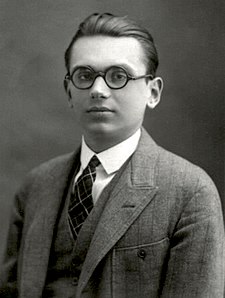Kurt Gödel
 From Citizendium - Reading time: 2 min
From Citizendium - Reading time: 2 min
Kurt Friedrich Gödel (1906 - 1978) was an Austrian-born, American mathematician remembered for proving that in any logical system rich enough to describe natural numbers, there are always statements that are true but impossible to prove within the system, and who is considered to be one of the most important figures in mathematical logic in modern times.[1]
His most well-known work is his famous incompleteness theorems[2], described as "among the handful of landmark theorems in twentieth century mathematics". [3] It stunned the mathematical world by proving that in any sufficiently complicated formal system (such as mathematics), there are statements in that formal system which cannot be proved to be either true or false.
His other very important work (equally significant, but less well known) was his work in set theory, where he proved that Georg Cantor's puzzling Continuum Hypothesis was consistent with the Axiom of Choice, and that both were consistent with the Zermelo-Fraenkel axioms. This achievement was characterized as "a tour de force and arguably the greatest achievement of his mathematical life .. because .. virtually all of the technical machinery used in the proof had to be invented ab initio." [4]
He also did considerable and important work in physics (where he had significant findings in the field of relativity) and in philosophy.
Further reading[edit]
- John W. Dawson, Jr., Logical dilemmas: The Life and Work of Kurt Gödel, Wellesley: A. K. Peters (1997)
- Wang, Hao, Reflections on Kurt Gödel, Cambridge: MIT Press (1987)
- Wang, Hao, A Logical Lourney: From Gödel to Philosophy, Cambridge: MIT Press (1996)
Particular topics[edit]
- Amir D. Aczel, The Mystery of the Aleph: Mathematics, the Kabbalah, and the Human Mind, New York: Barnes and Noble (2000) - Although mostly about Cantor and his work on infinities, this fine non-specialist work has a lengthy treatment of Gödel's work in the area.
- Yourgrau, Palle, A World Without Time: The Forgotten Legacy of Gödel and Einstein, New York: Basic Books (2005) - Intended for the non-specialist, this look at Goedel's less-known work in physics also contains extensive biographical material on Gödel.
Notes[edit]
- ↑ S. Feferman, S. Kleene, G. Moore, R. Solovay, and J. van Heijenoort (eds.): Gödel, Kurt, Collected Works. I: Publications 1929–1936, Oxford University Press, Oxford 1986.
- ↑ Read more about the incompleteness theorems in Wikipedia.
- ↑ Kurt Gödel at the Stanford Encyclopedia of Philosophy, Introduction
- ↑ Kurt Gödel at the Stanford Encyclopedia of Philosophy, Section 2.4.1
 KSF
KSF